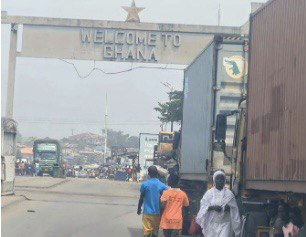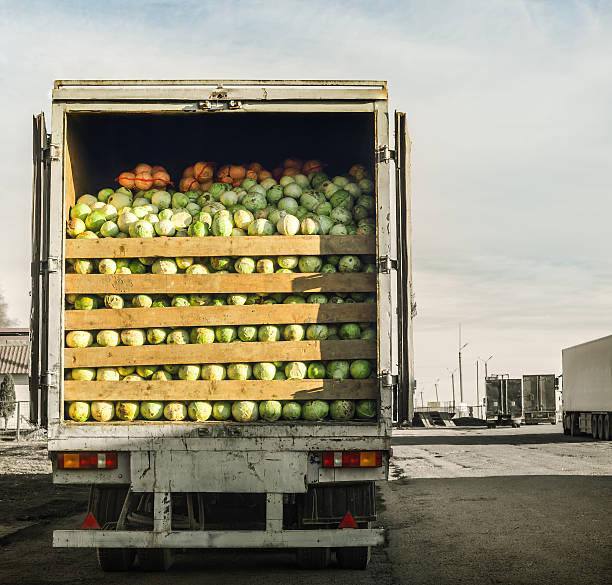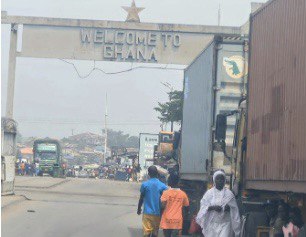MOVING FOOD ACROSS WEST AFRICA
-The Good, The Bad & The Promise
BY: EARL ANKRAH
& ASHWINI REKHA SEBASTIAN, OSEI OWUSU AGYEMANG, ALLSWELL OKAI, EBENEZER OFEI-ANSAH.
Intra-regional trade in agricultural and food products is crucial for West Africa's food system resilience, but persistent challenges result in lower official trade flows compared to other regions of Africa. Several policies have been formulated to facilitate and strengthen trade flows throughout the subregion. These include, among others, the ECOWAS Trade Liberalization Scheme (ETLS), the ECOWAS Common Agricultural Policy (ECOWAP) and the African Continental Free Trade Area (AfCFTA). Whilst the adoption of these policies and frameworks may be lauded, the evidence suggests that ECOWAS Member States are struggling with the implementation of these normative policies.
Subsequently, through the World Bank financed US$ 1.2 Billion West Africa Food Systems Resilience Program (FSRP), ECOWAS has designed and introduced the ECOWAS Agriculture Trade & Market Scorecard (EATM-S) as a flagship initiative, to monitor and enhance member states’ compliance with agreed standards.
THE GOOD
West Africa has been a well-established, integrated region since the early 8th century and was home to the first known African empires, such as the Ghana empire and the Mali empire (also known as Mandé) in the 13th century, which included territories of several current West African countries.Both empires had strong trade relationships with their neighbours. They had large gold endowments and were at the crossroads of traders coming from both the north (Maghreb region) and south (Soudano region). In addition to gold, copper, and salt, agricultural products were highly traded in the region (Source: Niane, 1987). Trade was facilitated by the presence of homogenous ethnolinguistic groups established in several countries, which were later fragmented in the colonial period. These included the Mandingo group - present in Mali, Burkina Faso, Côte d’Ivoire, Guinea, Guinea-Bissau, and Gambia, as well as the Fulani group - present in Mali, Senegal, Burkina Faso, Guinea, Guinea-Bissau, Ghana, Benin, Niger, and Nigeria. (Source: Bouet et al, 2024)
Created in 1975, the Economic Community of West African States (ECOWAS) was established to pursue stability and regional integration in Africa and, over time, has expanded its mandate to include political dimensions. A major milestone was achieved shortly thereafter, with the launch of the ETLSin 1979 to foster regional trade. The ETLS first covered agricultural and unprocessed products (for food security reasons) and handicrafts, before it was extended to industrial products in 1990.
In that light, Ghana, a prominent member of ECOWAS, continues to participate in ECOWAS’ regional integration efforts through our commitment to ratification and harmonization of several trade policies and initiatives such as the ETLS, ECOWAP and the establishment of AfCFTA in Ghana.
THE BAD
Irrespective of all these regional strides, the harmony hoped for, is but a mirage across the sub-region. As we speak, there is no evidence that this phenomenon has changed over the period. Barriers, checkpoints, never-ending pull-overs and road inspections still exist. High custom duties and other petty charges, near-intimidating documentation requirements at borders, administrative obstacles, long hours and delays,restrictions and prohibitions and poor road infrastructure across countries persist; not to mention, robbery, harassments and abuse of female traders, and civil wars continue to plague trade activities in the sub-region.
When it comes to traders in food and agri produce, theperilous impacts cut even deeper. Imagine moving tomatoes from one country to another and doing that through numerous barrier-stops, getting pulled-over and parked for hours,exposing foodstuffs to the mercy of extreme weather. This certainly leads to the foodstuffs losing their nutritional value – that is, if they ever get to their destination markets in any marketable shape. This erodes the profit margin of the trader - hence the tendency to marginally hike prices of the few that make it to the market, to make up for the losses. It also discourages more traders from participating in the enterprise, leaving the trade to only a handful of traders to dictate terms in the marketplace. Livestock are also not spared the dread. Travelling long distances on mostly bumpy roads disorients them, in addition to dehydration under the scorching sunacross time zones. Some eventually are unable to survive the journey.
THE PROMISE
 In view of these, the ECOWAS EATM-S performance measurement and tracking mechanism aims to identify gaps in the national implementation of regional agricultural and food trade policies.
In view of these, the ECOWAS EATM-S performance measurement and tracking mechanism aims to identify gaps in the national implementation of regional agricultural and food trade policies. Through the EATM-S, ECOWAS is monitoring and assessing the progress or otherwise being made by member countries towards breaking barriers, igniting speed, cutting costs and significantly increasing the volumes of trade in food and agricultural produce (particularly maize and rice across the sub-region from 20% to 30% by 2028). As part of the assessment process, public authorities and regulatory bodies across the sub-region - like Customs and Standards regulators, Chambersof Commerce, trade experts/practitioners and business advocacy groups, were surveyed for vital information to track national implementation of regional policies and regulations.Manufacturers, wholesalers, retailers, cross-border traders, forwarding agents, logistics/shipping and transport companiesalso divulged some critical information.
ECOWAS’ investigative focus was on a range of cross border administrative protocols and processes like the extent and value of intra-regional imports and exports of agricultural goods and inputs, restrictions. Time spent, costs, prohibitions and documentation requirements, custom duties or other charges, as well as the quality of transport infrastructure and frequency of road inspections and checkpoints were all under scrutiny. The outcome of this assessment will further increase transparency and accountability of agricultural trade within the sub-region. The results of this year’s scores are expected to be released within the 3rd quarter of 2025, when each member country’s performance in enhancing or stifling cross-border trade would be out for all to see.
Ghana’s Strategic Pitch
At the dawn of his second term, President Mahama embarked on a number of ‘Good Neighbourliness Tours’ aimed at reinforcing diplomatic and economic relations with Ghana’s neighbouring countries. During his visit to Mali, hehighlighted the vital role that long-distance truck drivers play in the economies of both nations. He acknowledged the existing challenges faced by these transporters, including cumbersome customs procedures, roadblocks, delays at border crossings, and unofficial fees imposed along the route. The President expressed his administration’s unwavering commitment to strengthening regional trade by ensuring that all barriers hindering the smooth transportation of goods between Ghana and Mali are removed. Similarly, in Burkina Faso, President Mahama announced ongoing discussions to introduce direct daily flights between Accra and Ouagadougou. This initiative aims to boost trade, connectivity and cross-border relations between Ghana and Burkina Faso, further strengthening bilateral ties.
These moves from Ghana are indeed crucial for fostering intra-regional trade and economic growth and enhancing relations between Ghana and its neighbours.
Already, through World Bank funding, FSRP Ghana is upgrading facilities such as laboratories and offices belonging to the Plant Protection and Regulatory Services Directorate (PPRSD) of the Ministry of Food and Agriculture (MoFA) at 4 border stations located at Paga, Hamile, Sampa and Aflao. The Project is also set to upgrade selected bulk markets – Bolga, Abofour, Ejura, Agogo and Denu - where substantial intra-regional trade in rice, maize, among others are carried out. These interventions would not only facilitate improvement in Sanitary and Phytosanitary (SPS) activities but would also boost agricultural trade between Ghana and its neighbours.
SHADOWS OF ECOMOG
‘FSRP Ghana’ believes that where trade and commerce fail to go, conflicts and hunger go! In the past, ECOWAS was primarily recognised for its peacekeeping activities within the subregion, particularly through the ECOWAS Cease-fire Monitoring Group (ECOMOG). Ghana has been pivotal in these efforts geared at fostering and entrenching regional peace and stability - through the contribution of troops, ammunition, intelligence, funding and sterling diplomacy. But now, marching forward, ECOWAS, the World Bank, Ghana and sister FSRP nations are taking up arms against hunger, climate perils and food insecurity. From the perspective of ‘FSRP Ghana’, ECOWAS-led peace-keeping efforts offered a platform for Ghana to showcase her GENERALS. In like manner, an ECOWAS-led campaign against food insecurity should produce ‘Generals-In-Agriculture’ for Ghana!
EARL ANKRAH is the Communications & Knowledge Management Specialist of FSRP Ghana
Dr. ASHWINI REKHA SEBASTIAN is a Senior Agriculture Economist at World Bank Ghana; the Regional Task Team Leader, FSRP (West Africa) & Task Team Leader of FSRP Ghana
OSEI OWUSU AGYEMANG is the Project Coordinator of FSRP Ghana
EBENEZER OFEI-ANSAH is an Agricultural Economist at World Bank Ghana
ALLSWELL OKAI is an Agriculture Economist at FSRP Ghana



Leave a comment
Comments (0)
No comments yet. Be the first to comment!